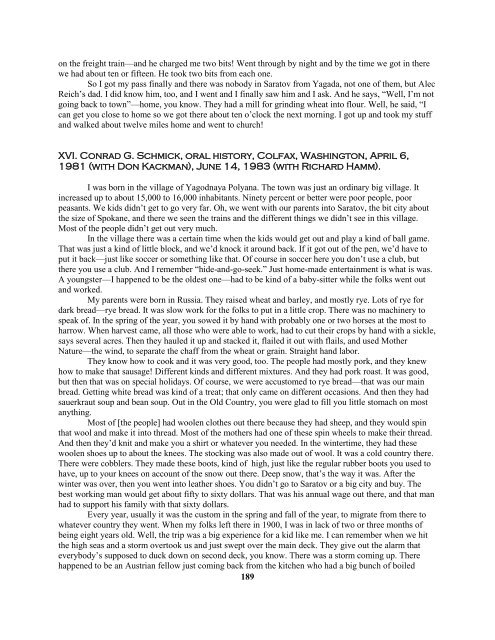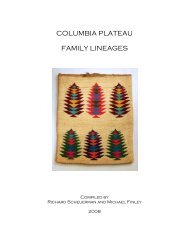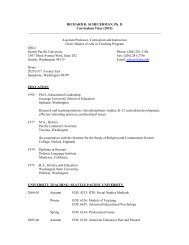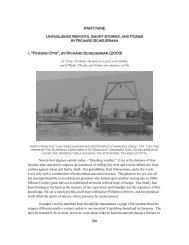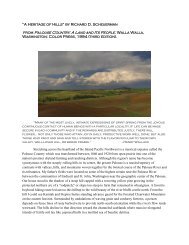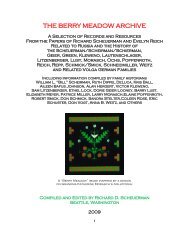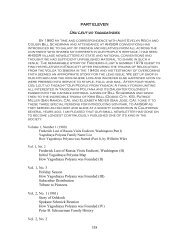PART SEVEN Oral Histories and Family Memoirs - Mountain Light ...
PART SEVEN Oral Histories and Family Memoirs - Mountain Light ...
PART SEVEN Oral Histories and Family Memoirs - Mountain Light ...
Create successful ePaper yourself
Turn your PDF publications into a flip-book with our unique Google optimized e-Paper software.
on the freight train—<strong>and</strong> he charged me two bits! Went through by night <strong>and</strong> by the time we got in there<br />
we had about ten or fifteen. He took two bits from each one.<br />
So I got my pass finally <strong>and</strong> there was nobody in Saratov from Yagada, not one of them, but Alec<br />
Reich‟s dad. I did know him, too, <strong>and</strong> I went <strong>and</strong> I finally saw him <strong>and</strong> I ask. And he says, “Well, I‟m not<br />
going back to town”—home, you know. They had a mill for grinding wheat into flour. Well, he said, “I<br />
can get you close to home so we got there about ten o‟clock the next morning. I got up <strong>and</strong> took my stuff<br />
<strong>and</strong> walked about twelve miles home <strong>and</strong> went to church!<br />
XVI. Conrad G. Schmick, oral history, Colfax, Washington, April 6,<br />
1981 (with Don Kackman), June 14, 1983 (with Richard Hamm).<br />
I was born in the village of Yagodnaya Polyana. The town was just an ordinary big village. It<br />
increased up to about 15,000 to 16,000 inhabitants. Ninety percent or better were poor people, poor<br />
peasants. We kids didn‟t get to go very far. Oh, we went with our parents into Saratov, the bit city about<br />
the size of Spokane, <strong>and</strong> there we seen the trains <strong>and</strong> the different things we didn‟t see in this village.<br />
Most of the people didn‟t get out very much.<br />
In the village there was a certain time when the kids would get out <strong>and</strong> play a kind of ball game.<br />
That was just a kind of little block, <strong>and</strong> we‟d knock it around back. If it got out of the pen, we‟d have to<br />
put it back—just like soccer or something like that. Of course in soccer here you don‟t use a club, but<br />
there you use a club. And I remember “hide-<strong>and</strong>-go-seek.” Just home-made entertainment is what is was.<br />
A youngster—I happened to be the oldest one—had to be kind of a baby-sitter while the folks went out<br />
<strong>and</strong> worked.<br />
My parents were born in Russia. They raised wheat <strong>and</strong> barley, <strong>and</strong> mostly rye. Lots of rye for<br />
dark bread—rye bread. It was slow work for the folks to put in a little crop. There was no machinery to<br />
speak of. In the spring of the year, you sowed it by h<strong>and</strong> with probably one or two horses at the most to<br />
harrow. When harvest came, all those who were able to work, had to cut their crops by h<strong>and</strong> with a sickle,<br />
says several acres. Then they hauled it up <strong>and</strong> stacked it, flailed it out with flails, <strong>and</strong> used Mother<br />
Nature—the wind, to separate the chaff from the wheat or grain. Straight h<strong>and</strong> labor.<br />
They know how to cook <strong>and</strong> it was very good, too. The people had mostly pork, <strong>and</strong> they knew<br />
how to make that sausage! Different kinds <strong>and</strong> different mixtures. And they had pork roast. It was good,<br />
but then that was on special holidays. Of course, we were accustomed to rye bread—that was our main<br />
bread. Getting white bread was kind of a treat; that only came on different occasions. And then they had<br />
sauerkraut soup <strong>and</strong> bean soup. Out in the Old Country, you were glad to fill you little stomach on most<br />
anything.<br />
Most of [the people] had woolen clothes out there because they had sheep, <strong>and</strong> they would spin<br />
that wool <strong>and</strong> make it into thread. Most of the mothers had one of these spin wheels to make their thread.<br />
And then they‟d knit <strong>and</strong> make you a shirt or whatever you needed. In the wintertime, they had these<br />
woolen shoes up to about the knees. The stocking was also made out of wool. It was a cold country there.<br />
There were cobblers. They made these boots, kind of high, just like the regular rubber boots you used to<br />
have, up to your knees on account of the snow out there. Deep snow, that‟s the way it was. After the<br />
winter was over, then you went into leather shoes. You didn‟t go to Saratov or a big city <strong>and</strong> buy. The<br />
best working man would get about fifty to sixty dollars. That was his annual wage out there, <strong>and</strong> that man<br />
had to support his family with that sixty dollars.<br />
Every year, usually it was the custom in the spring <strong>and</strong> fall of the year, to migrate from there to<br />
whatever country they went. When my folks left there in 1900, I was in lack of two or three months of<br />
being eight years old. Well, the trip was a big experience for a kid like me. I can remember when we hit<br />
the high seas <strong>and</strong> a storm overtook us <strong>and</strong> just swept over the main deck. They give out the alarm that<br />
everybody‟s supposed to duck down on second deck, you know. There was a storm coming up. There<br />
happened to be an Austrian fellow just coming back from the kitchen who had a big bunch of boiled<br />
189


